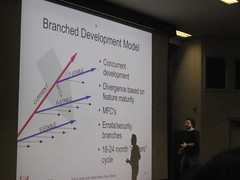
Tuesday, March 31, 2015
Monday, March 01, 2010
Friday, December 04, 2009
Your Brain at Work - video
Let me quote the video's description:
In his new book "Your Brain at Work," coach David Rock depicts the story of two people over one day at the office, and what's happening in their brains that makes it so hard to focus and be productive. Not only does he explain why things go wrong, but how you can train your brain to improve thinking and performance at work. Based on interviews with 30 neuroscientists, he's developed strategies to help you work smart all day.
Interesting subjects being covered are: why managers screw up your job satisfaction; why smart people are better at managing their own productivity; where actual job satisfaction comes from.
Regarding that last one, it appears that our brains have built-in sensors for:
- certainty,
- status,
- fairness,
- autonomy,
- relatedness.
Whenever we experience a threat to one of these, we experience negative emotions, and vice versa. Remember, this is built into our brains. Very enlightening stuff.
I'm curious to know what mind-tricks or psychology/neurology topics you use or encounter when at work. I usually have a good self-monitoring system telling me when I'm being productive, or warning me when I need some down time.
Thursday, November 12, 2009
private/personal time and the networked individual

Coined as a talk about intimacy in the digital communication age, this presentation by Stefana Broadbent turns out to be more about how constant communication with people in your private and professional networks blurs the distinction between private and professional spheres.
The steadily emerging culture of networked individualism, enabled by the abundance of communication methods, is slowly changing the private/professional divide. Broadbent accurately describes how fixed times and rituals, extended periods away from (the location of) the private sphere have defined the working life. It appears even our schools are modeled in this fashion to prepare kids for their working lives to come.
This either/or proposition is now slowly eroding. Since communication technology evolved, means of communication have been eagerly adopted by networking individuals. Only when the communication channels (e-mail, instant messaging, texting) became less interruptive and more casual (as opposed to, say, the telephone), everyone jumped on it, and started blurring the divide.
This blurring of the work/private boundary goes both ways. Private time is invaded with work demands, and 'office time' is sometimes used for private matters. Why do we think this is so strange? I can't think of a reason other than our centuries long habituation and (I suspect) a tendency for group-think. You're either inside or outside the organization. You enter in the morning, leave in the evening.
Once the communication channels were unobtrusive enough to be used at the work place without the boss noticing, every one started to cross the divide, and reach out to their private network, which consists for the most part of other people at their workplaces, doing the same. So much for private/professional and inter-organizational boundaries.
A common, natural reaction from management was to forbid these boundary crossing activities and make sure every one was still 100% work focussed for 8 hours a day.
Interestingly, managers love the fact that they can now make work demands when you are in your 'very separated' private sphere, but this newfound 'flexibility' should go one way only (namely theirs), it appears.
What are your experiences, as a networked individual trying to cross the private/professional divide? How does your company handle it? Do you think it's important? Leave a comment, I would love to hear it.
Monday, November 02, 2009
Leadership and Vision
Highly recommended video:
From the youtube page: "Jerry Porrass research interests are the characteristics of visionary companies in both the United States and Europe; the dynamics of planned organizational change process; organizational vision and its influence on the long-term behavior organizations; and leadership."
Most notable point for me was the speakers answer to a question from the audience, about what one could do if someone 'higher up' was screwing things up or being very counter productive. Paraphrasing: don't confront directly, you will lose. Just spend energy where you have influence. If you and your team under your influence spend enough time doing crazy stuff to counter the bad influence, in order to still produce some results, this waste of effort will get noticed higher up. Then, salvation will come.
Of course, in a democratic organization this sort of bad influence and the resulting waste of energy to counter it, would never happen in the first place.
From the youtube page: "Jerry Porrass research interests are the characteristics of visionary companies in both the United States and Europe; the dynamics of planned organizational change process; organizational vision and its influence on the long-term behavior organizations; and leadership."
Most notable point for me was the speakers answer to a question from the audience, about what one could do if someone 'higher up' was screwing things up or being very counter productive. Paraphrasing: don't confront directly, you will lose. Just spend energy where you have influence. If you and your team under your influence spend enough time doing crazy stuff to counter the bad influence, in order to still produce some results, this waste of effort will get noticed higher up. Then, salvation will come.
Of course, in a democratic organization this sort of bad influence and the resulting waste of energy to counter it, would never happen in the first place.
Tuesday, August 25, 2009
Dan Pink on the surprising science of motivation
Please, please, watch this. Career analyst Dan Pink examines the puzzle of motivation, starting with a fact that social scientists know but most managers don't: Traditional rewards aren't always as effective as we think. Listen for illuminating stories -- and maybe, a way forward.
Friday, January 02, 2009
we are the elite who can.
 Image by bitmask via FlickrI just ran across this from the Coding Horror blog. I'm glad to say all of my colleagues are within the apparently elite 1% who do know how to write code. Maybe I should challenge them with this task to make sure ;)
Image by bitmask via FlickrI just ran across this from the Coding Horror blog. I'm glad to say all of my colleagues are within the apparently elite 1% who do know how to write code. Maybe I should challenge them with this task to make sure ;)
Friday, May 02, 2008
Notification for feed consumers
The rss feed for this site has been changed to http://feeds.feedburner.com/howwework.
Please update your rss clients.
Please update your rss clients.
Tuesday, April 08, 2008
Automation for the people: Continuous Integration anti-patterns
 Image by Phillie Casablanca via FlickrAutomation for the people: Continuous Integration anti-patterns discusses some interesting no-no's in software development team practice.
Image by Phillie Casablanca via FlickrAutomation for the people: Continuous Integration anti-patterns discusses some interesting no-no's in software development team practice.Today I ran into one, namely 'infrequent check-ins' but it was hidden under a pile of branching/merging confusion.
I was discussing branching and merging strategies for the development teams with one of the team members. He explained how work was done for some time, apparently to his satisfaction. A project team would branch off a release branch at the point when a release was going in acceptance test. The team would work on that, fixing issues, and would never merge back into the trunk, except for some cherry-picked bugs.
So far, I don't object to this way of working, but I introduced the idea of personal branches, or an alternative, feature branches, where developers would create branches for every feature, work on that and then merge it back into the stream of the release where that feature belonged in. Wholesale merges, in other words.
This was out of the question. Merges were supposed to be controlled, high exception operations performed under high levels of scrutiny.
This encourages infrequent check-ins: it prevents developers from doing frequent check-ins while working on their own corner of the project. A developer shouldn't only check in when they want to add a major feature; Ideally one should check in after every few lines of code which prove ok. However if one pollutes the main source tree with every little commit, then, yes, this is impractical.
The solution however is not to delay or generally discourage merges. One should setup branching policy so that developers can check-in however often they want without bothering the main line.
Conclusion
Sometimes it takes some time to discover a bad practice in disguise. The no-no of 'Infrequent Checkins', and all the other anti-patterns too, can be disguised in many ways of 'practice' which seems perfectly reasonable by itself. Until you fully work through the consequences.
Btw, don't forget to read part 2 of the anti-patterns article.
Thursday, March 27, 2008
The Selfish Class
The Selfish Class
Another gem from the author(s) of 'The Big Ball Of Mud' (see links in the sidebar).
The basic question of the essay is what would a class need to have/do in order to promote its own re-use.
Another gem from the author(s) of 'The Big Ball Of Mud' (see links in the sidebar).
The basic question of the essay is what would a class need to have/do in order to promote its own re-use.
Subscribe to:
Posts (Atom)
Unless otherwise expressly stated, all original material of whatever nature created by razor_nl and included in the 'How We Work' weblog and any related pages, including the weblog's archives, is licensed under a Creative Commons License.

